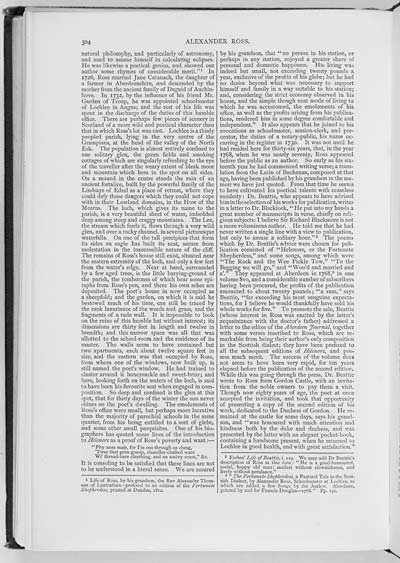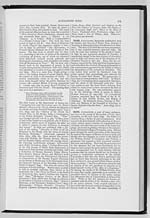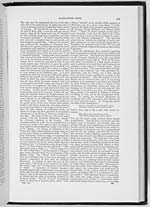304
natural philosophy, and particularly of astronomy,
and used to amuse himself in calculating eclipses.
He was likewise a poetical genius, and showed our
author some rhymes of considerable merit."1 In
1726, Ross married Jane Catanach, the daughter of
a farmer in Aberdeenshire, and descended by the
mother from the ancient family of Duguid of Auchin-
hove. In 1732, by the influence of his friend Mr.
Garden of Troup, he was appointed schoolmaster
of Lochlee in Angus; and the rest of his life was
spent in the discharge of the duties of this humble
office. There are perhaps few pieces of scenery in
Scotland of a more wild and poetical character than
that in which Ross's lot was cast. Lochlee is a thinly
peopled parish, lying in the very centre of the
Grampians, at the head of the valley of the North
Esk. The population is almost entirely confined to
one solitary glen, the green fields and smoking
cottages of which are singularly refreshing to the eye
of the traveller after the weary extent of bleak moor
and mountain which hem in the spot on all sides.
On a mound in the centre stands the ruin of an
ancient fortalice, built by the powerful family of the
Lindsays of Edzel as a place of retreat, where they
could defy those dangers which they could not cope
with in their Lowland domains, in the How of the
Mearns. The loch, which gives its name to the
parish, is a very beautiful sheet of water, imbedded
deep among steep and craggy mountains. The Lee,
the stream which feeds it, flows through a very wild
glen, and over a rocky channel, in several picturesque
waterfalls. On one of the tall precipices that form
its sides an eagle has built its nest, secure from
molestation in the inaccessible nature of the cliff.
The remains of Ross's house still exist, situated near
the eastern extremity of the loch, and only a few feet
from the water's edge. Near at hand, surrounded
by a few aged trees, is the little burying-ground of
the parish, the tombstones of which bear some epi-
taphs from Ross's pen, and there his own ashes are
deposited. The poet's house in now occupied as
a sheepfold; and the garden, on which it is said he
bestowed much of his time, can still be traced by
the rank luxuriance of the weeds and grass, and the
fragments of a rude wall. It is impossible to look
on the ruins of this humble hut without interest; its
dimensions are thirty feet in length and twelve in
breadth; and this narrow space was all that was
allotted to the school-room and the residence of its
master. The walls seem to have contained but
two apartments, each about twelve square feet in
size, and the eastern was that occupied by Ross,
from whom one of the windows, now built up, is
still named the poet's window. He had trained to
cluster around it honeysuckle and sweet-briar; and
here, looking forth on the waters of the loch, is said
to have been his favourite seat when engaged in com-
position. So deep and confined is the glen at this
spot, that for thirty days of the winter the sun never
shines on the poet's dwelling. The emoluments of
Ross's office were small, but perhaps more lucrative
than the majority of parochial schools in the same
quarter, from his being entitled to a sort of glebe,
and some other small perquisites. One of his bio-
graphers has quoted some lines of the introduction
to Helenore as a proof of Ross's poverty and want:�
"Pity anes mair, for I'm out-through as clung,
'Twas that grim gossip, chandler-chafted want
Wi' thread-bare claething, and an ambry scant," &c.
It is consoling to be satisfied that these lines are not
to be understood in a literal sense. We are assured
1 Life of Ross, by his grandson, the Rev Alexander Thom-
son of Lentrathen�prefixed to an edition of the Fortunate
Shepherdess, printed at Dundee, 1812.
by his grandson, that "no person in his station, or
perhaps in any station, enjoyed a greater share of
personal and domestic happiness. His living was
indeed but small, not exceeding twenty pounds a
year, exclusive of the profits of his glebe; but he had
no desire beyond what was necessary to support
himself and family in a way suitable to his station;
and, considering the strict economy observed in his
house, and the simple though neat mode of living to
which he was accustomed, the emoluments of his
office, as well as the profits arising from his publica-
tions, rendered him in some degree comfortable and
independent." It also appears that he joined to his
avocations as schoolmaster, session-clerk, and pre-
centor, the duties of a notary-public, his name oc-
curring in the register in 1730. It was not until he
had resided here for thirty-six years, that, in the year
1768, when he was nearly seventy, Ross appeared
before the public as an author. So early as his six-
teenth year he had commenced writing verse; a trans-
lation from the Latin of Buchanan, composed at that
age, having been published by his grandson in the me-
moir we have just quoted. From that time he seems
to have cultivated his poetical talents with ceaseless
assiduity: Dr. Beattie, who appears to have advised
him in the selection of his works for publication, writes
in a letter to Dr. Blacklock, " He put into my hands a
great number of manuscripts in verse, chiefly on reli-
gious subjects: I believe Sir Richard Blackmore is not
a more voluminous author. He told me that he had
never written a single line with a view to publication,
but only to amuse a solitary hour."2 The poems
which by Dr. Beattie's advice were chosen for pub-
lication consisted of "Helenore, or the Fortunate
Shepherdess," and some songs, among which were
"The Rock and the Wee Pickle Tow," "To the
Begging we will go," and " Woo'd and married and
a. They appeared at Aberdeen in 1768,3 in one
volume 8vo, and a considerable number of subscribers
having been procured, the profits of the publication
amounted to about twenty pounds; "a sum," says
Beattie, "far exceeding his most sanguine expecta-
tions, for I believe he would thankfully have sold his
whole works for five." To promote the sale, Beattie
(whose interest in Ross was excited by the latter's
acquaintance with the doctor's father) addressed a
letter to the editor of the Aberdeen Journal, together
with some verses inscribed to Ross, which are re-
markable from being their author's only composition
in the Scottish dialect; they have been prefixed to
all the subsequent editions of Helenore, and pos-
sess much merit. The success of the volume does
not seem to have been very rapid, for ten years
elapsed before the publication of the second edition.
While this was going through the press, Dr. Beattie
wrote to Ross from Gordon Castle, with an invita-
tion from the noble owners to pay them a visit.
Though now eighty years of age, the poet at once
accepted the invitation, and took that opportunity
of presenting a copy of the second edition of his
work, dedicated to the Duchess of Gordon. He re-
mained at the castle for some days, says his grand-
son, and "was honoured with much attention and
kindness both by the duke and duchess, and was
presented by the latter with an elegant pocket-book,
containing a handsome present, when he returned to
Lochlee in good health, and with great satisfaction."
2 Forbes' Life of Beattie, i. 119. We may add Dr Beattie's
description of Ross at this date: " He is a good-humoured,
social, happy old man: modest without clownishness, and
lively without petulance."
3 " The Fortunate Shepherdess, a Pastoral Tale in the Scot-
tish Dialect, by Alexander Ross, Schoolmaster at Lochlee, to
which are added a few Songs by the Author. Aberdeen,
printed by and for Francis Douglas�1768." Pp. 150.

![]() Universal Viewer |
Universal Viewer | ![]() Mirador |
Large image | Transcription
Mirador |
Large image | Transcription
![]()

